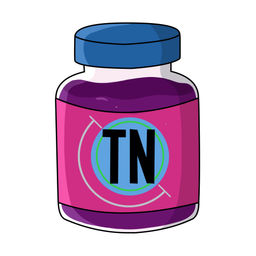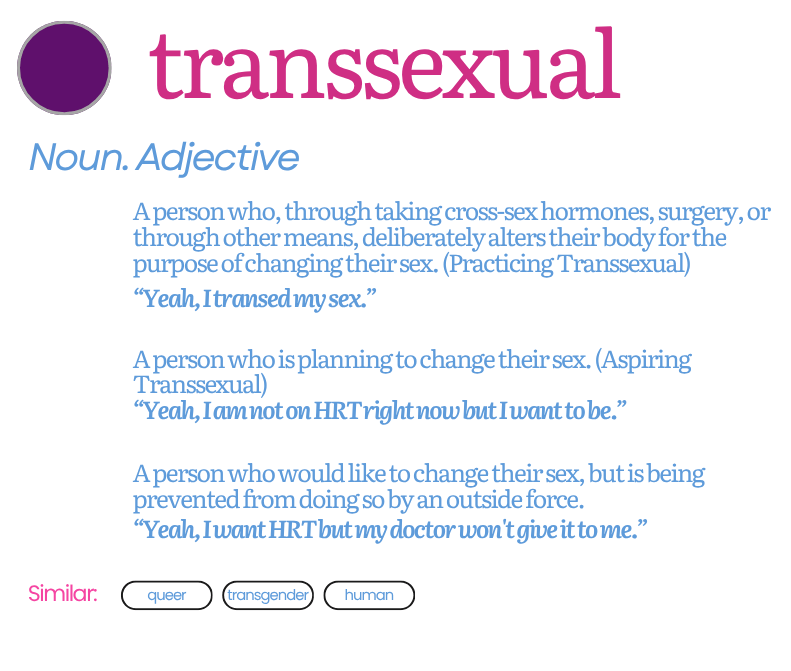Why Some Trans People are Reclaiming the Term 'Transsexual', and Why I Am One of Them
There is a distinction in needs and experiences for those of us who do take steps to materially change our sex compared to those of us who do not. This distinction should be recognized rather than erased.

Why are so many trans people calling themselves transsexual lately?
If you are out of the loop, it might sound like a step backwards. Transsexual is an older term that has been out of fashion for decades.
Until recently, the term was mostly associated with the bigoted system of medical gatekeeping that most trans people, including those that are reclaiming it, have no love for. The current reclamation has nothing to do with that.
While transgender is a broad term to describe those whose genders are different from those assigned at birth, transsexual is a more precise term for those who use hormones and other techniques to change their sex.
As access to the means of changing sex have grown, and as these means have become more effective at changing our secondary sex characteristics, a growing importance has been placed on these tools.
As I have argued, hormone replacement therapy (HRT) is not just a set of tools, it is the very means by which we take control of our own bodies.
It ought to be protected and cherished.
At the same time, the rise of fascism has put access to HRT in jeopardy.
Wherever fascism takes hold in government, in the medical system, and in the hearts of doctors, access to transsexual medicine is cut off.
These forces try to enforce a monopoly of medicine over those they see as undeserving of it.
That result is that anyone reliant on their doctors for hormones is either cut off, or forced to follow the demands of others.
This attack on our basic needs is intolerable. It also puts into focus how our needs are quite different from some groups under the transgender label.
Some trans people need cross-sex hormones to live. Some trans people don't.
This is not just a medical distinction, it’s a fundamental difference in needs. Some trans people live their lives and organize their communities around maintaining access to the means of changing sex at all costs. Some trans people don't have to think about that.
There ought to be a way to talk about this difference outside of medical jargon.
The term that many have found fit to use for this purpose is ‘transsexual’, with the process of transition called “changing sex”.
In the past, the term "changing sex”, if it was taken seriously at all, referred only to surgeries that changed a person’s genitals to be different from those at birth.
This is why, until recently, it was standard to force transsexuals to be sterilized and have bottom surgery before their legal gender markers could be changed.
This has all changed. The more we learn about the biology of sex characteristics, the more ways we discover in which Hormone Replacement Therapy (HRT) alters the sex characteristics of the human body.
This has led to the rise of the term “transsexual medicine” to describe the process.
Sign up for The Needle
Culture and News: By and For Transsexuals
No spam. Unsubscribe anytime.
At the same time, the ability of people to share information about the proper use of HRT has led to new discoveries about how to make it more effective.
The result is a rising community of practice that is not reliant on the input of doctors.
These innovations have led to a revival of the term “transsexual” in common use. It places the emphasis not on the past misalignment between the body and mind, but on the act of changing sex, which is an active and ongoing process.
Whereas in the past it was common to speak of HRT as a form of gender expression, today it is seen as a tool for changing sex.
Conflating HRT and gender is often seen as inaccurate or offensive.
This has been controversial, to put it mildly.
The term “transsexual” shares the name with the old term used by transmedicalist doctors for the group of trans people they deemed worthy of transitioning.
As such, many have interpreted the term as being elitist, a way to distinguish which group is ‘the most trans’.
These objections have been strongest among people who began transitioning before the informed consent model was introduced, and associate the term with exclusionary rhetoric.
However, the current reclaiming of the term has nothing to do with that.
As Anna Leigh points out,
“Transsexuals are the only minority [that aren’t] allowed to have words to delineate our own in-group. We receive insane levels of hostility from the extended transgender community whenever we try to talk about our own issues.”
This inability to talk about our own issues and to have them taken seriously has led to both alienation from broader transgender spaces, and the insistence on using the label of transsexual as a distinguishing marker from said spaces.
The more hostility we face for calling ourselves transsexuals, the more alienated we become from transgender and queer spaces, and in turn, the more likely we are to call ourselves transsexuals.
The result is a growing rift between trans people who medically transition and those that don't.
If this is to be healed, our interests have to be taken seriously. That means understanding us in the way we understand ourselves.
From the very moment that the distinction between transsexual and transgender was explained to me in these terms, I instantly embraced it. It gave language to the disconnect I’ve had with broader transgender culture for as long as I’ve been out. It explained why I was so much closer with the trans people that transitioned than those that didn't.
This is why I call myself a transsexual. This is why the tagline of this website reads “By and for transsexuals”. If we are to fight for our dignity, we need the language to explain how we are able to live with dignity.
This language has fundamentally changed how I understand myself.
I am a post-transition trans woman. I have transitioned my sex from male to female. I have D cups and a vagina, and pass 100% of the time. I don't think about my gender any more than the average cis person. My body and mind are now about as aligned as most cissexuals.
In contrast, the fact that I transitioned my sex comes up every single day.
It comes up when I take my pills in the morning and evening. It comes up when I take progesterone at night. It comes up when I dilate my new vagina. It comes up when I get electrolysis to remove excess facial and body hair.
It is inseparable from my daily life.
Calling me transgender is technically correct, and this has been true from the moment I was born. However, it places the emphasis on my past body/mind misalignment, and neglects the fact that this is mostly a solved issue for me.
The term transsexual is both precise and informative. It makes clear both who I am and the actions I take to live with dignity.
I aspired to change my sex the moment I learned it was possible. I became a practicing transsexual the moment I put my first pill under my tongue.
I am transgender; but more precisely, I am transsexual. Both terms describe me, but transsexual fits better. So that is what I call myself.
If you are unsure what to call yourself, ask what is more important to you: the fact of your body and mind being out of alignment (either currently or in the past), or the fact that you are making active steps to fix this misalignment? Which fact do you want to have emphasized?
For decades, the term 'transgender’ has served as a label to unify a number of peoples whose gender identity was different from that assigned at birth.
The inability to recognize the different experiences of groups within this label is leading to the collapse of any sense of unity. Any label that conflates the experiences of people who materially change their sex and people who do not can be harmful in its homogenization of the diversity of human experience.
Until this is stopped, and our interests are taken seriously, transsexuals will continue to distance ourselves from broader queer/transgender culture and politics.
The solution isn't for transsexuals to shut up, it’s for us to be taken seriously.
There is a discussion to be had, that as alluded to above, not everyone who needs HRT can access it.
The solution to this is universal, free at the point of service healthcare, including over the counter HRT, which currently doesn’t exist anywhere. (Thailand has OTC HRT, but it’s pay-to-play.)
The original version of this article was accused by some of being about passing politics or public optics. This article was never meant to solve those issues.
My article also had nothing to do with validity, or anything of the sort.
I was focused on the different needs of different types of trans people, how they differ from one another, and the language we use to discuss these needs. That was always the central point.
I have since gone more into depth on the issue here:
 The Needle - NewsJane Migliara Brigham
The Needle - NewsJane Migliara Brigham
Author’s note: My colleague Artemis wrote a different article, released around the same time, about caricatures of trans women, which highlights some of the issues with cissexual advocacy in media. These have always been two different articles, however.
Editor’s Note: After feedback from our community and workshopping among our entire team, we have republished a revised version of this article with a new subhead and a new conclusion.
We also removed the section that went on a tangent about "men in dresses" and "angry shaved hair dykes". In context, this section was about how cis people see us, both trans men and trans women.
We hope the new version better addresses the original spirit of the article and our community's feedback.
Do you think more about your gender or your sex? Which would you rather change? Which do you want your body to align with?
If you liked this article, please consider signing up for our email list.
While there, please consider signing up for one of our paid subscription tiers. They start at 5 euros a month.
Sign up for The Needle
Culture and News: By and For Transsexuals
No spam. Unsubscribe anytime.

